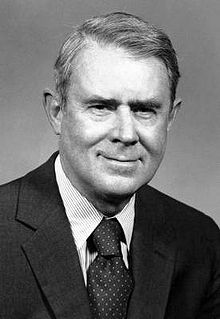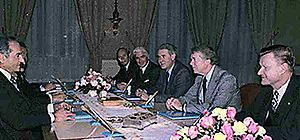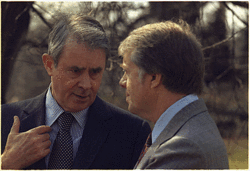- Cyrus Vance
-
For the Manhattan District Attorney, see Cyrus Vance Jr.
Cyrus Vance 
57th United States Secretary of State In office
January 20, 1977 – April 28, 1980President Jimmy Carter Deputy Warren Christopher Preceded by Henry Kissinger Succeeded by Edmund Muskie 7th United States Secretary of the Army In office
July 5, 1962 – January 21, 1964President John F. Kennedy
Lyndon B. JohnsonPreceded by Elvis Jacob Stahr, Jr. Succeeded by Stephen Ailes United States Deputy Secretary of Defense In office
1964–1967President Lyndon B. Johnson Preceded by Roswell Gilpatric Succeeded by Paul H. Nitze Personal details Born March 27, 1917
Clarksburg, West VirginiaDied January 12, 2002 (aged 84)
New York CityResting place Arlington National Cemetery, Arlington County, Virginia
38°52′37″N 77°04′15″W / 38.876806°N 77.070795°WCoordinates: 38°52′37″N 77°04′15″W / 38.876806°N 77.070795°WPolitical party Democratic Spouse(s) Grace "Gay" Sloane Children Elsie, Camilla, Grace, Cyrus Alma mater Yale University
Yale Law School (1942)Profession Lawyer Signature 
Military service Service/branch United States Navy Years of service 1942–1946 Rank Lieutenant Unit USS Hale (DD-642) Cyrus Roberts Vance (March 27, 1917 – January 12, 2002) was an American lawyer and United States Secretary of State under President Jimmy Carter from 1977 to 1980. Prior to that position he was the Secretary of the Army[1] and the Deputy Secretary of Defense.
As Secretary of State, Vance approached foreign policy with an emphasis on negotiation over conflict and a special interest in arms reduction. In April 1980, Vance resigned in protest of Operation Eagle Claw, the secret mission to rescue American hostages in Iran. He was succeeded by Edmund Muskie.
Vance was the cousin (and adoptive son) of 1924 Democratic presidential candidate and lawyer John W. Davis. He was the father of Manhattan District Attorney Cyrus Vance, Jr.
Contents
Early life and education
Vance was born in Clarksburg, West Virginia[1]. He graduated from Kent School in 1935[1] and earned a bachelor's degree in 1939 from Yale University[1], where he was a member of the secret society Scroll and Key. He also earned three varsity letters in ice hockey at Yale. He graduated from Yale Law School in 1942[1].
Military and legal career
Vance served in the United States Navy as a gunnery officer on the destroyer USS Hale (DD-642) until 1946, and then joined the law firm Simpson Thacher & Bartlett in New York City[1], before entering government services.
Political career
Vance was the Secretary of the Army during the John F. Kennedy administration[1]. He was Secretary when Army units were sent to northern Mississippi in 1962 to protect James Meredith and ensure that the court-ordered integration of the University of Mississippi took place[1].
As Deputy Secretary of Defense under President Lyndon Johnson, he first supported the Vietnam War but by the late 1960s changed his views and resigned from office advising the president to pull out of South Vietnam. In 1968 he served as a delegate to peace talks in Paris[1]. He received the Presidential Medal of Freedom in 1969[1]. He was a professor at Georgetown University afterwards.[specify]
As Secretary of State in the Jimmy Carter administration, Vance pushed for negotiations and economic ties with the Soviet Union, and clashed frequently with the more hawkish National Security Advisor Zbigniew Brzezinski. Vance tried to advance arms limitations by working on the SALT II agreement with the Soviet Union, which he saw as the central diplomatic issue of the time. He was heavily instrumental in Carter's decision to return the Canal Zone to Panama, and in the Camp David Accords agreement between Israel and Egypt.[citation needed]
After the Camp David Accords, Vance's influence in the administration began to wane as Brzezinski's rose.[citation needed] His role in talks with People's Republic of China was marginalized, and his advice for a response to the Shah of Iran's collapsing regime was ignored. Shortly thereafter, when 53 American hostages were held in Iran, he worked actively in negotiations but to no avail. Finally, when Carter ordered a secret military rescue - Operation Eagle Claw - Vance resigned in opposition. Vance felt the rescue attempt was too risky, and did not even wait to see its failure before announcing his resignation.[2] The second rescue was planned but never carried out.
 The Shah of Iran Mohammad Reza Pahlavi meeting with Arthur Atherton, William H. Sullivan, Vance, President Jimmy Carter, and Zbigniew Brzezinski in 1977.
The Shah of Iran Mohammad Reza Pahlavi meeting with Arthur Atherton, William H. Sullivan, Vance, President Jimmy Carter, and Zbigniew Brzezinski in 1977.
In 1997, he was made the original honorary chair of the American Iranian Council.[citation needed]
Later career in law and as Special Envoy
From 1974 to 1976, Vance served as president of the New York City Bar Association.[citation needed] Vance returned to his law practice at Simpson Thacher & Bartlett in 1980, but was repeatedly called back to public service throughout the 1980s and 1990s, participating in diplomatic missions to Bosnia, Croatia, and South Africa.
In 1991 he was named Special Envoy of the Secretary-General of the United Nations for Croatia and proposed a plan for solution of conflict in Croatia. Authorities of Croatia and Serbia agreed to Vance's plan, but the leaders of SAO Krajina rejected it, even though it offered Serbs quite a large degree of autonomy by the rest of the world's standards, as it did not include full independence for Krajina. He continued his work as member of Zagreb 4 group. The plan they drafted, named Z-4, was effectively superseded when Croatian forces retook the Krajina region (Operation Storm) in 1995.
In January 1993, as the United Nations Special Envoy to Bosnia, Vance and Lord David Owen, the EU representative, began negotiating a peace plan for the ending the War in Bosnia. The plan was rejected, and Vance announced his resignation as Special Envoy to the UN Secretary-General. He was replaced by Norwegian Foreign Minister Thorvald Stoltenberg.
Later life and death
In 1993, he was awarded the United States Military Academy's Sylvanus Thayer Award.
In 1995, Cyrus Vance again acted as Special Envoy of the Secretary-General of the United Nations and signed the interim accord as witness in the negotiations between the Republic of Macedonia and Greece.
Vance was a member of the Trilateral Commission.[when?]
He died aged 84 after a long battle of pneumonia in New York after having Alzheimer's disease for many years,[citation needed] and was interred at Arlington National Cemetery.
His mother's house, known as the Stealey-Goff-Vance House, was listed on the National Register of Historic Places in 1979.[3] It is home to the Harrison County Historical Society.
References
- ^ a b c d e f g h i j Bell, William Gardner (1992). ""Cyrus Roberts Vance"". Secretaries of War and Secretaries of the Army: Portraits and Biographical Sketches. United States Army Center of Military History. http://www.history.army.mil/books/sw-sa/Vance.htm. Retrieved September 22, 2007.
- ^ Sean Wilentz (2008). The Age of Reagan. New York: Harper Collins. p. 119.
- ^ "National Register Information System". National Register of Historic Places. National Park Service. 2010-07-09. http://nrhp.focus.nps.gov/natreg/docs/All_Data.html.
External links
- Oral History Interviews with Cyrus Vance, from the Lyndon Baines Johnson Library
- Cyrus R. Vance and Grace Sloane Vance Papers, 1957-1992, held at Yale University Library, Manuscripts & Archives
- Cyrus Vance at Find a Grave
- Interview on French TV: Cartes sur table, 31 March 1980 (40 minutes)
Political offices Preceded by
Elvis Jacob Stahr, Jr.United States Secretary of the Army
Served under: John F. Kennedy, Lyndon Johnson
July 1962–January 1964Succeeded by
Stephen AilesPreceded by
Roswell GilpatricUnited States Deputy Secretary of Defense
1964–1967Succeeded by
Paul NitzePreceded by
Henry KissingerUnited States Secretary of State
Served under: Jimmy Carter
1977–1980Succeeded by
Edmund MuskieUnited States Secretary of State Secretary of Foreign Affairs
1781–1789Secretary of State
1789–presentJefferson • Randolph • Pickering • J. Marshall • Madison • Smith • Monroe • Adams • Clay • Van Buren • E. Livingston • McLane • Forsyth • Webster • Upshur • Calhoun • Buchanan • Clayton • Webster • Everett • Marcy • Cass • Black • Seward • Washburne • Fish • Evarts • Blaine • Frelinghuysen • Bayard • Blaine • Foster • Gresham • Olney • Sherman • Day • Hay • Root • Bacon • Knox • Bryan • Lansing • Colby • Hughes • Kellogg • Stimson • Hull • Stettinius • Byrnes • G Marshall • Acheson • Dulles • Herter • Rusk • Rogers • Kissinger • Vance • Muskie • Haig • Shultz • Baker • Eagleburger • Christopher • Albright • Powell • Rice • Clinton
 United States Secretaries of War and Secretaries of the Army
United States Secretaries of War and Secretaries of the ArmySecretaries at War 

Secretaries of War Knox • Pickering • McHenry • Dexter • Dearborn • Eustis • Armstrong • Monroe • W. Crawford • Calhoun • Barbour • P. Porter • Eaton • Cass • Poinsett • Bell • Spencer • J. Porter • Wilkins • Marcy • G. Crawford • Conrad • J. Davis • Floyd • Holt • S. Cameron • Stanton • Schofield • Rawlins • Belknap • A. Taft • J. Cameron • McCrary • Ramsey • R. Lincoln • Endicott • Proctor • Elkins • Lamont • Alger • Root • W. Taft • Wright • Dickinson • Stimson • Garrison • Baker • Weeks • D. Davis • Good • Hurley • Dern • Woodring • Stimson • Patterson • RoyallSecretaries of the Army Assistant Secretaries of War Scott • Dana • Eckert • Grant • Doe • Meiklejohn • Sanger • Oliver • Breckinridge • Ingraham • Crowell • Williams • Wainwright • D. Davis • MacNider • Hurley • Payne • Woodring • L. Johnson • Patterson • McCloy • PetersenUnder Secretaries of the Army Categories:- United States Secretaries of State
- New York lawyers
- American lawyers
- American military personnel of World War II
- Kennedy Administration personnel
- Lyndon B. Johnson Administration personnel
- Mount Holyoke College faculty
- Presidential Medal of Freedom recipients
- United States Deputy Secretaries of Defense
- United States Navy officers
- United States Secretaries of the Army
- Kent School alumni
- Yale Law School alumni
- Yale University alumni
- Operation Condor
- 1917 births
- American adoptees
- 2002 deaths
- Burials at Arlington National Cemetery
- People from Clarksburg, West Virginia
- People from New York City
- Adoptees adopted by relations
Wikimedia Foundation. 2010.



